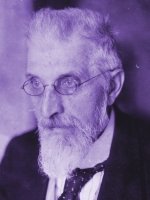Karl Holl
| Karl Holl | |
|---|---|
 |
|
| Born | 15 May 1866 Tübingen |
| Died | 23 May 1926 Berlin |
| Nationality | German |
| Fields |
Theology Church History |
| Institutions |
University of Tübingen University of Berlin |
| Alma mater |
University of Tübingen University of Berlin |
Karl Holl (May 15, 1866—May 23, 1926 in Berlin) was a Professor of theology and church history at Tübingen and Berlin and is considered one of the most influential church historians of his era.
Karl Holl studied philosophy and theology at the Tübinger Stift. He became a member of the Studentenverbindung (student association) Normannia. While serving as a minister in Württemberg, he completed his doctorate and became the lead tutor (Repetent) at the Tübinger Stift in 1891. From 1894 he was active as a research assistant at the Prussian Academy of Sciences at the instigation of Adolf von Harnack. He completed his Habilitation in 1896 at the theological faculty of Berlin. In 1901 he became associate professor (Extraordinarius) of church history at the University of Tübingen, from 1906 he was Professor (Ordinarius) at the University of Berlin. On December 17, 1914 he was admitted as a full member of the Prussian Academy of Sciences. He also served from 1912 to 1926 as “Ephorus” of the Evangelical Theological Seminary, the Stiftung Johanneum, in Berlin. His grave is located at the church cemetery in Stahnsdorf.
Karl Holl's theological development is characterized by the outlook of the “Tubingen school” of Ferdinand Christian Baur. He published numerous studies on Martin Luther, which made a fundamental contribution to scholarship and remain important today. Holl’s works interpret the Lutheran religious and God concept as “Gewissensreligion” (a religion of conscience) and helped spark the “Luther Renaissance.” He returned the doctrine of justification to its place in the center of theology.
...
Wikipedia
